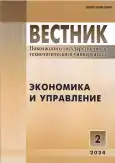Digital Transformation of Agribusiness Management
- Authors: Ostaev G.Y.1, Gogolev I.M.1, Kondratiev D.V.1, Zlobina O.O.1
-
Affiliations:
- Udmurt State Agricultural University
- Issue: No 2 (2024)
- Pages: 33-43
- Section: REGIONAL AND SECTORAL ECONOMICS
- URL: https://journal-vniispk.ru/2306-2800/article/view/292375
- DOI: https://doi.org/10.25686/2306-2800.2024.2.33
- EDN: https://elibrary.ru/GGRDZO
- ID: 292375
Cite item
Full Text
Abstract
Introduction. The issues of digitalization of agribusiness management are currently becoming increasingly relevant. Digital innovations are a kind of symbiosis of digital solutions and agribusiness processes, which are necessary for carrying out agricultural activities, as well as for improving its competitiveness and ensuring the country’s food security. At the same time, the effectiveness of the implementation of digital technologies should take into account their necessity, relevance, manufacturability, payback, harmlessness and feasibility for business development.
The purpose of the research is to study the digital transformation of management of an agricultural organization and reveal the theoretical and practical foundations of agrarian business.
Methods. The opinions of scientists and specialists in the fields of economics, management and digitalization were studied. The methods of analysis, synthesis and abstraction of data available, as well as the questionnaire survey method were used.
Results. Management of high-tech agricultural production is a complex of digital and mobile solutions (artificial intelligence) that make it possible to promptly respond to the set goals and objectives, conduct analysis, determine trends in agricultural production, and make strategic decisions. Artificial intelligence in the economics of an agricultural organization has great potential and is designed to help solve problems both in agricultural production and in the economy of the country as a whole. Modern agricultural production management with its planning and forecasting methods requires the acceleration of big data processing and managerial decision-making. Digital technologies can fundamentally change the work of entire industries and lead to the elimination of traditional, primarily economic and geographical boundaries.
Conclusion. Information obtained and processed via digital and mobile technologies can not only speed up the decision-making process, but also improve it, taking into account environmental and other indicators relevant to agriculture. A competent digital transformation of agricultural business management should be carried out across all positions simultaneously, including mobile digital technologies (mobile phones, mobile applications), the Internet of Things, artificial intelligence and robotization of agricultural production. The combination of these solutions will allow agribusiness enterprises only to increase their production volumes, but also to improve the quality characteristics of products and reduce costs at all technological stages of agricultural production.
About the authors
Gamlet Ya. Ostaev
Udmurt State Agricultural University
Email: nfo@udsau.ru
SPIN-code: 3674-4120
Candidate of Economic Sciences, Dean of the Faculty of Economics, Associate Professor at the Department of Accounting, Finance and Audit
Russian Federation, 11, Studencheskaya St., Izhevsk, 426069Igor M. Gogolev
Udmurt State Agricultural University
Author for correspondence.
Email: nfo@udsau.ru
SPIN-code: 4763-3350
Doctor of Economic Sciences, Professor, Head of the Department of Economics and Organization of Agro-Industrial Complex
Russian Federation, 11, Studencheskaya St., Izhevsk, 426069Dmitry V. Kondratiev
Udmurt State Agricultural University
Email: nfo@udsau.ru
SPIN-code: 2684-9950
Candidate of Economic Sciences, Associate Professor at the Department of Management and Law
Russian Federation, 11, Studencheskaya St., Izhevsk, 426069Oksana O. Zlobina
Udmurt State Agricultural University
Email: nfo@udsau.ru
SPIN-code: 5622-9609
Candidate of Economic Sciences, Associate Professor at the Department of Accounting, Finance and Audit
Russian Federation, 11, Studencheskaya St., Izhevsk, 426069References
- Ostaev G. Ya., Alborov R. A., Zlobina O. O. et al. Financial modeling and planning of innovative activities taking into account economic, information, environmental and social factors. Monograph. Izhevsk: Shelest Publ., 2024. 208 p. EDN: LTLUPK (In Russ.).
- Ostaev G. Ya., Zlobina O. O., Gogolev I. M. et al. Financial management: planning, design and management. Russian Journal of Management. 2023;11(1):193–210. doi: 10.29039/2409-6024-2023-11-1-193-210; EDN: ZHCVTA (In Russ.).
- Abramova O. V., Akmarov P. B., Kravchenko N. A. et al. Development of the digital economy in agriculture. Monograph. Izhevsk: Izhevsk State Agricultural Academy, 2019. 204 p. EDN: OFCPEO (In Russ.).
- Alborov R. A., Kozmenkova S. V., Dzhikiya M. K. Qualimetric accounting for agricultural products, land and biological assets. International Accounting. 2023;26(7(505)):754–768. doi: 10.24891/ia.26.7.754; EDN: VHOTNI (In Russ.).
- Akmarov P. B., Berestova D. A., Alborov G. R. et al. Assessing the potential of digitalization in the agro-industrial complex. Scientific developments and innovations in solving strategic problems of the agro-industrial complex: materials of the International scientific and practical conference (Izhevsk, February 15–18, 2022). In 2 volumes. Vol. 1. Izhevsk: Izhevsk State Agricultural Academy; 2022:116–119. EDN: FAMNKZ (In Russ.).
- Gorbushina N. V., Mironova M. V., Kravchenko N. A. et al. The importance of using information systems in land management. Managing the efficiency of land use: proceedings of the 2nd National Scientific and Practical Conference (Izhevsk, March 16, 2020). Izhevsk: Izhevsk State Agricultural Academy; 2020:104–108. EDN: PYQCBH (In Russ.).
- Isaev D. V. Development of information support systems for corporate governance and strategic management. Audit and Financial Analysis. 2013;(6):329–333. EDN: RPJOLX (In Russ.).
- Klychova G. S., Bagaev I. V., Poplaukhina T. D. Automation as a factor in adapting the methodology to modern accounting and control capabilities. Economic Analysis: Theory and Practice. 2024;23(4(547)):691–712. doi: 10.24891/ea.23.4.691; EDN: IH-HERZ (In Russ.).
- Semin A. N., Gogolev I. M., Markovina E. V. et al. Regional features of structural changes in the development of livestock farming. Agro-food Policy in Russia. 2024;(1(109)):15–20. doi: 10.35524/2227-0280_2024_01_15; EDN: PRMXNF (In Russ.).
- Sutygina A. I. Features of the integration of Russian agrofood complex into a globalizing economy. Economics of Agriculture of Russia. 2023;(1):101–108. doi: 10.32651/231-101; EDN: GSQWYN (In Russ.).
- Sutygina A. I., Ovchinnikova A. V., Bratsikhin A. A. Strategic development areas of the regional agrifood systems in the context of provision of food safety of the population. Bulletin of Udmurt University. Series Economics and Law. 2021;31(6):1001–1009. doi: 10.35634/2412-9593-2021-31-6-1001-1009; EDN: BXXPLY (In Russ.).
Supplementary files








